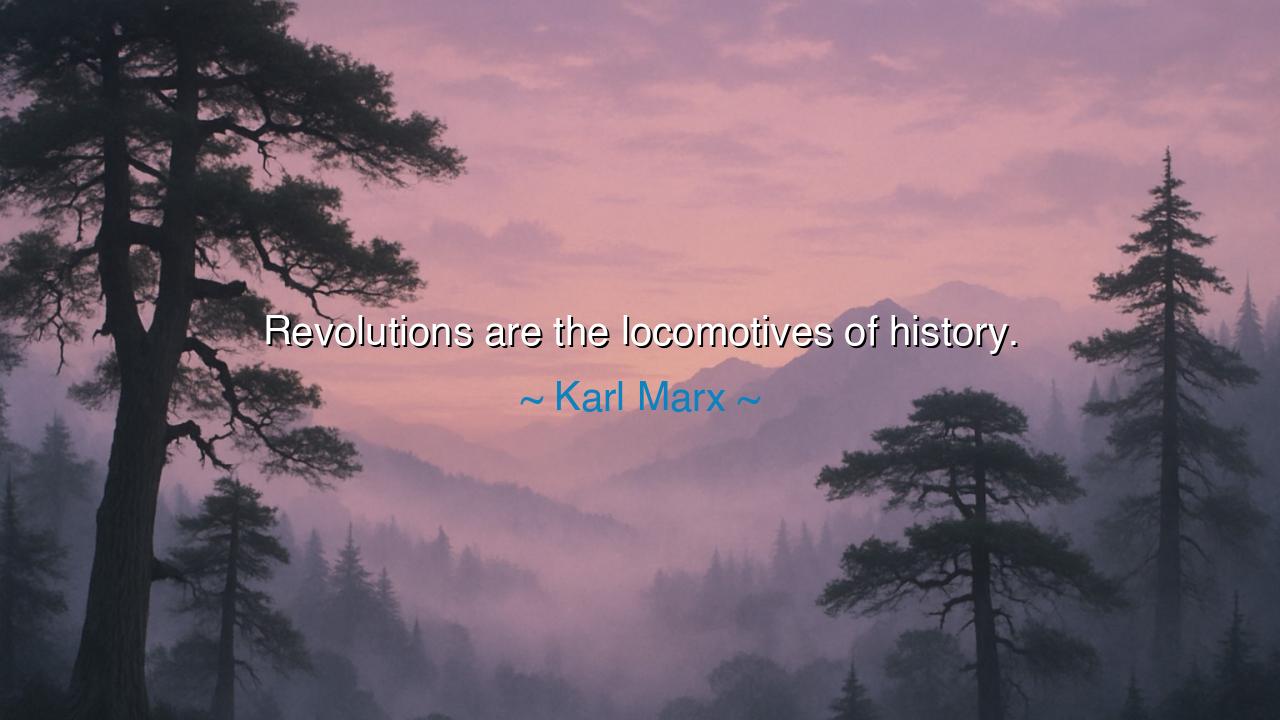
Revolutions are the locomotives of history.






“Revolutions are the locomotives of history.” Thus wrote Karl Marx, the philosopher of upheaval and change, whose gaze penetrated the shifting patterns of human destiny. In this single sentence, he condensed the fiery heartbeat of civilization — the eternal struggle between stagnation and motion, oppression and awakening. To Marx, revolution was not a fleeting storm, but the engine that drives the train of history forward, thundering down the tracks of time, crushing the old and carrying the new into being. His words are not merely political; they are cosmic, capturing the essence of all transformation — for nothing that lives can remain still. The world advances only through conflict, through crisis, through the burning away of what no longer serves life.
To understand this, one must see history not as a placid river but as a force of fire and steel. Every age builds its own order — kings, empires, hierarchies of power — and for a time, that order seems eternal. Yet slowly, silently, tension builds beneath the surface. The masses, whose labor sustains the mighty, begin to stir. Injustice grows heavy, the weight of inequality too great to bear, and from this pressure is born revolution — the locomotive that breaks the rails of the old world and lays new tracks in its place. Marx saw this not as chaos, but as necessity. He believed that revolution was the mechanism by which society evolves, the means through which humanity sheds its outworn skin.
In the 19th century, when Marx wrote these words, the world trembled with the noise of machines and the cries of workers. The Industrial Revolution had transformed life itself, birthing wealth for the few and hardship for the many. Cities swelled with laborers who built the engines of progress but reaped little of its reward. In that crucible of inequality, Marx perceived a larger pattern — that all history is a struggle between classes, between those who own and those who toil. And when that struggle reaches its breaking point, revolution erupts — not as an accident, but as the natural eruption of long-suppressed forces. Thus, history does not crawl forward — it leaps. Revolution, in Marx’s eyes, was the leap of humanity toward a new stage of its journey.
Consider the French Revolution, that great thunderclap that shattered the old world. For centuries, France had been ruled by kings who believed their power divine, while the people starved in their shadow. But when despair turned to fury, the nation rose. Thrones fell, and with them the illusion that power was a gift from heaven. The cry for liberty, equality, and fraternity spread like wildfire across the earth, igniting revolutions in distant lands. Though it brought terror as well as triumph, the revolution’s locomotive carried humanity forward into a new age — the age of the citizen, the age of rights. The world that followed was forever changed.
Marx saw in such upheavals a grand and terrible beauty. To him, revolution was not merely destruction, but creation through destruction — the clearing of the ground upon which a fairer society might one day be built. The locomotive of history does not move gently; it roars, it shakes, it tears apart the rails of tradition. Yet in its wake, the rubble becomes the foundation for new life. Even those revolutions that fail leave behind the memory of courage and the blueprint for future generations to complete the task. Every movement, every rebellion, pushes the train a little further down the track toward justice.
But there is warning, too, in Marx’s metaphor. The locomotive is a force of tremendous power — and power, once unleashed, can run wild. Those who drive the revolution must do so with vision and purpose, or else the engine will derail, turning liberation into tyranny. History has shown both the glory and the tragedy of revolutions — from the storming of the Bastille to the fall of empires in the 20th century. Yet even in their failures, they testify to the unquenchable spirit of humanity, forever striving to break free of its own chains. The train of progress may slow, but it never stops.
So, my child of tomorrow, when you hear Karl Marx’s words, do not think only of politics, but of life itself. For revolution is not confined to nations — it lives in every human soul. When injustice reigns within you, when fear rules your spirit, when habit chains your heart, you too must become your own locomotive of change. Tear up the rails that bind you to the past, and lay down new tracks that lead toward freedom and truth. For as history teaches, nothing great is achieved by standing still. The universe itself moves through cycles of birth and destruction, and we, its children, must learn to move with it.
Remember this: revolutions are the locomotives of history, and history is not distant — it is being written with every choice you make. When the time comes for you to act, act boldly. When the world grows weary of injustice, be among those who build the next track. For though the train of history may thunder with violence and uncertainty, it always moves toward dawn. And those who understand its rhythm — those who embrace the power of change with wisdom and compassion — become not passengers, but conductors of the future.






AAdministratorAdministrator
Welcome, honored guests. Please leave a comment, we will respond soon